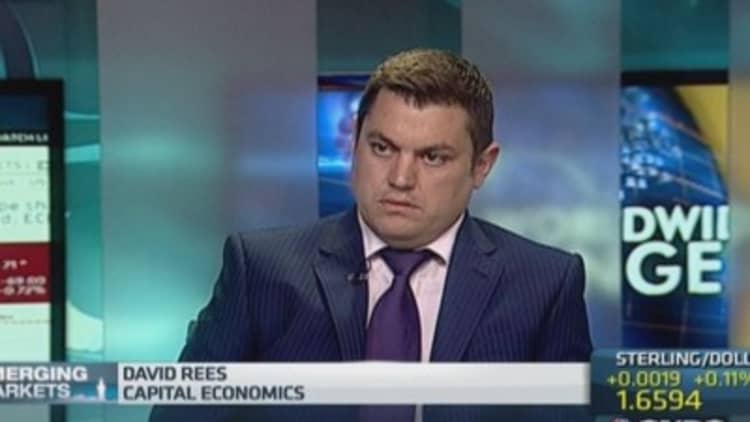It seems as if the whole world is scrambling to cope with falling prices, but one South American economy has still managed to create inflation that runs at an eye-popping 65 percent.
It's Venezuela, and data from the Institute of International Finance shows how the country's done it: by money-printing and deficit spending.
Two charts below tell the story. One shows the money supplied to the system (what economists call M2). It's gone nowhere but up.
The second chart shows what is the equivalent of deficit spending. It's how much Venezuela's government-run oil company has borrowed from the central bank in order to finance social programs. In a quirk particular to Venezuela, the country uses its oil company, PDVSA, for its social spending programs, skimming off large parts of its revenue to pay for them. It's also shown a willingness to borrow from its central bank when it needs more than PDVSA can supply.
Considering that Venezuela pumps more than 2 million barrels of oil per day, one may expect that the country would have enough money. But the country's spending continues to skyrocket. One analyst at Nomura estimates that Venezuela may need oil prices to hit $200 per barrel in order to balance its budget. (The figure is difficult to determine precisely, because Venezuela doesn't disclose as much economic data as most countries do.)
Venezuela's situation is in great contrast to much of the rest of the world. Prices of stocks and commodities, including oil, are moving lower on global economic fears.

Recent meetings of the International Monetary Fund make it clear that central bankers around the world (with the notable exception of the Germans) fear that Europe will suffer deflation—a decline in prices. Just as inflation can be debilitating to an economy, so too is deflation, which makes consumers and businesses delay purchases on the assumption that prices will be lower later.
Europe isn't in deflation—yet. It's experiencing disinflation, which is a decline in the rate of inflation. Germany, Europe's largest economy, has pushed back against the idea of printing and spending money in order to boost the continent's economy. They argue that while it may lead to inflation, it doesn't necessarily lead to a better economy.
Which brings us back to Venezuela. The country has too much inflation, and not enough growth, stemming from economic policies that have led to shortages of simple consumer goods like toilet paper and encouraged major international companies to abandon the country.


